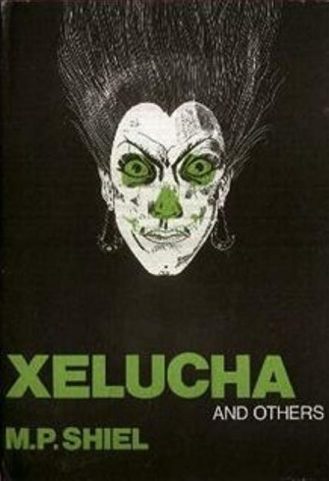 By M.P. SHIEL (Arkham House; 1975)
By M.P. SHIEL (Arkham House; 1975)
A collection that proves the old truism that what seems innovative to one generation is insufferable to another—well, M.P. Shiel’s work isn’t insufferable, but it’s certainly irritating.
Matthew Phipps Shiel (1865-1947) was a prolific author during the early half of the Twentieth Century. His nearly forty books include “classics” like THE PURPLE CLOUD, THE LORD OF THE SEA and HOW THE OLD WOMAN GOT HOME; I’ve tried to read each of those novels at various times and have been unable to get through any of them. Shiel’s extremely florid prose has been praised as “colorful” and “sensuous,” but I find it overwritten and self-indulgent, a bit like Clark Ashton Smith without the readability.
Having been unable to penetrate his novels, I decided to take a chance on the author’s short fiction, the best of which is supposed to be contained in this posthumous Arkham House collection. Turns out these tales are every bit as pretentious as Shiel’s long-form work, although at least they’re shorter.
The title story heads the collection, and is a good representation of the author’s inimitable style: it’s a simple account of a zombie woman overwritten to the point of absurdity, with an evident love of punctuation (I literally wore myself out trying to tally all the colons, semi-colons and dashes) and a hysterical tone (there are more exclamation points per page than I can recall seeing in any other book) that quickly grows wearying.
The remaining eleven tales follow suit. Certainly Shiel had a fertile imagination and a flair for macabre storytelling, as evinced by his devious juxtaposition of two women, both named Rachel, in “The Bride”, and the ingenuity with which he conceals the perpetrator of the suspicious killing at the heart of “The Case of Euphemia Raphash”. Other tales are effective, but only in parts, in particular the macabre climax of “The Bell of St. Sepulcre,” which serves to unforgettably underline the title. “The Tale of Henry and Rowena”, on the other hand, has a riveting set-up involving a man warding off a ferocious animal by ripping off one of his own arms and using it as a club, but suffers from a predictable ending.
The stand-outs? Those would be “The Pale Ape” and “The House of Sounds”. The former is a tale of an ape-man notable for the fact that it’s actually fairly straightforward; it’s a rare instance in which the author actually seemed as interested in his narrative as his own overwrought prose. “The House of Sounds” is widely recognized by H.P. Lovecraft and others as Shiel’s finest story. I found it fairly effective, if overlong and pretentious (complaints I can apply to Shiel’s entire oeuvre), being an eerie account of a mariner stuck on an uncharted Scandinavian island inhabited by otherworldly creatures.
Of course this book, along with M.P. Shiel’s many novels, is now long out of print. As much as I fume about good books lapsing out of print, I’ll have to confess that in many cases, like XELUCHA AND OTHERS, there’s often a reason for the neglect.
